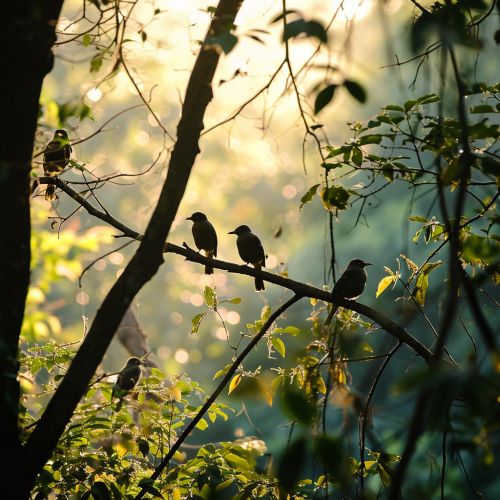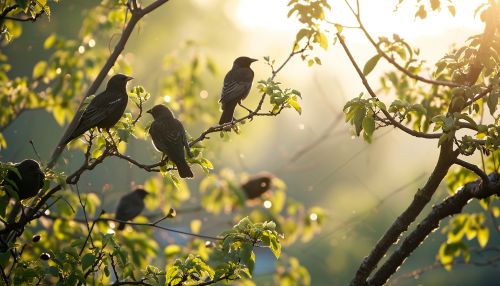Matutinal
Introduction
Matutinal, derived from the Latin word 'Matutinus', refers to anything related to or occurring in the morning. The term is often used in various fields such as biology, astronomy, and literature. It is an adjective that describes the habits or characteristics of an organism, celestial body, or even human activities that occur or are active primarily during the morning hours morning hours.
Biological Significance
In the field of biology, matutinal is used to describe organisms that are most active during the morning hours. These organisms, known as matutinal organisms, have adapted to exploit the environmental conditions of the morning, such as lower temperatures and reduced competition for resources. Matutinal behavior is common among many species of birds, insects, and mammals.
Matutinal Birds
Many bird species are known to be matutinal, with their activities peaking during the early morning hours. This behavior is often associated with feeding and mating activities. For example, the songbirds are known for their morning chorus, which is a behavior that is believed to be related to mate attraction and territory defense territory defense.


Matutinal Insects
Similarly, many insects are also matutinal. This is particularly true for pollinating insects such as bees and butterflies, which take advantage of the abundance of nectar in the morning. Some insects, like certain species of mosquitoes, are also matutinal, as they are most active in seeking their blood meals during the morning hours mosquito behavior.
Matutinal Mammals
Among mammals, matutinal behavior is less common but still present in certain species. For example, some species of primates, such as the mantled howler monkey, are known to be most active during the morning hours. This behavior is believed to be related to their feeding habits, as they take advantage of the abundance of food resources available in the morning primate behavior.
Astronomical Significance
In astronomy, the term matutinal is used to describe celestial bodies that are visible in the morning sky before sunrise. These are also known as morning apparitions. The visibility of these celestial bodies during the morning hours is dictated by their position relative to the sun and their orbital characteristics astronomical objects.
Matutinal Stars
Stars that rise just before sunrise are referred to as matutinal stars. Their visibility in the morning sky is determined by the Earth's rotation and their position in the sky relative to the sun. The term is often used in the context of fixed stars, which maintain a consistent position relative to each other and appear to rotate around the Earth stars.
Matutinal Planets
Similarly, planets that are visible in the morning sky before sunrise are referred to as matutinal planets. The visibility of these planets is determined by their orbital position relative to the sun and the Earth. For example, Venus is often referred to as the 'Morning Star' due to its visibility in the morning sky before sunrise planets.
Literary Significance
In literature, the term matutinal is often used to describe scenes, activities, or characteristics that occur in the morning. It is used to evoke the atmosphere, mood, or setting of the early morning hours. This can include descriptions of the morning light, the activities of people or animals, or the feelings and emotions associated with the start of a new day literature.
